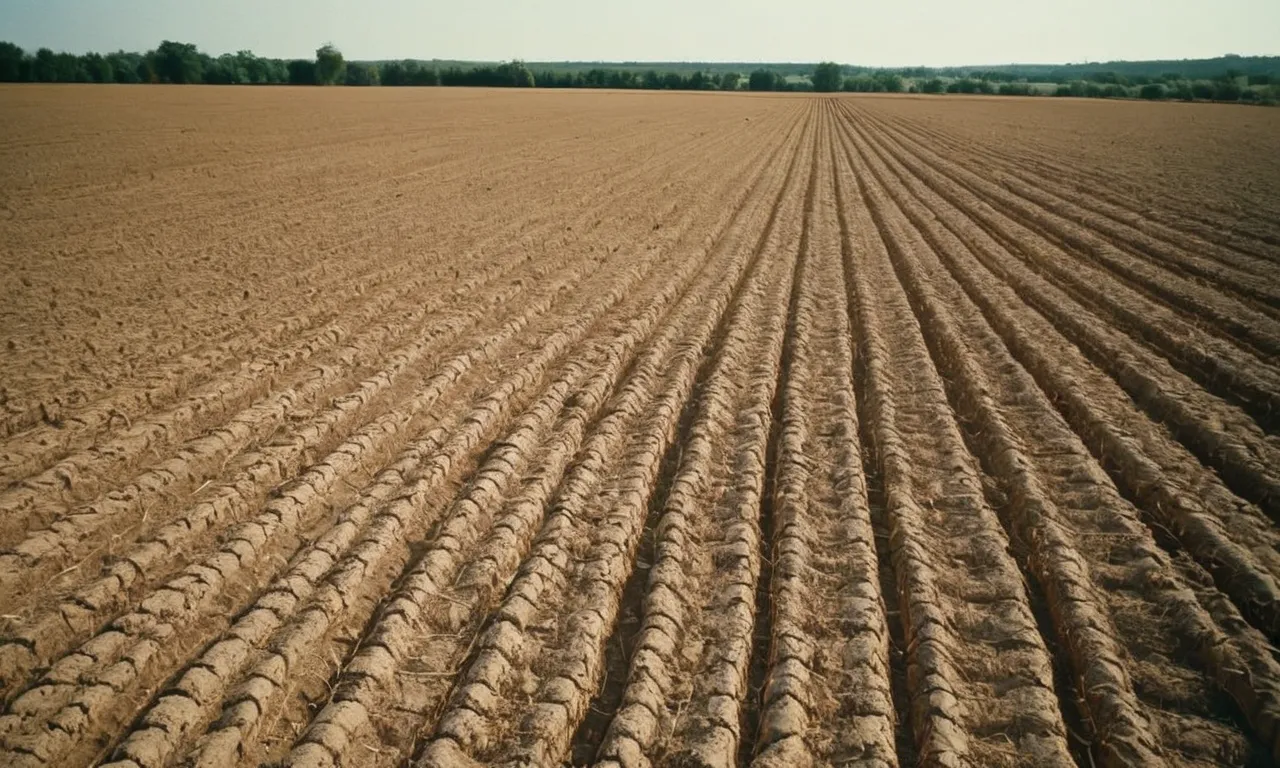What Is Fallow Ground In The Bible? A Detailed Look At Its Meaning And Significance
The concept of fallow ground appears several times in the Bible, especially in the Old Testament. But what exactly does it mean and why is it significant? In this comprehensive article, we’ll take an in-depth look at fallow ground, examine key biblical passages, unpack its symbolic meaning, and discuss its relevance for Christians today.
If you’re short on time, here’s the quick answer: In the Bible, fallow ground refers to hardened hearts and lives that need to be cultivated, prepared, and sown with God’s truth in order to bear spiritual fruit and prosper.
It represents the inner condition that all people need in order to receive and grow from hearing God’s word.
Defining Fallow Ground in the Bible
Literal Meaning
In its most literal sense, fallow ground refers to uncultivated land that has been left unseeded during a growing season. Farmers would intentionally let fields lie fallow periodically in order to restore nutrients and organic matter to the soil.
Allowing the land to rest enabled it to become more fertile and productive for future planting. The practice of crop rotation, which is still used today, involves letting portions of farmland lie fallow for a season.
Several verses in the Bible mention fallow ground in this agricultural context. For example, Exodus 23:11 instructs, “But the seventh year you shall let it rest and lie fallow, that the poor of your people may eat; and what they leave, the beasts of the field may eat.”
Letting the land rest every seventh year helped preserve its fertility. In 2 Chronicles 36:21, the prophet Jeremiah foretold that the Promised Land would “enjoy its Sabbaths as long as it lies desolate” during the Babylonian exile, implying a restorative fallow period after years of overcropping.
Figurative Meaning and Symbolism
While fallow ground literally refers to uncultivated soil, the Bible also uses the term figuratively to represent the spiritual condition of human hearts and minds. Just as allowing fields to lie fallow restores their agricultural potential, the prophets often called people to “break up” and cultivate the fallow ground of their hearts so that God’s truth could take root within them.
Several key Biblical passages shed light on this symbolic usage of the term:
- In Hosea 10:12, God exhorts Israel, “Sow for yourselves righteousness; reap steadfast love; break up your fallow ground, for it is the time to seek the Lord, that he may come and rain righteousness upon you.”
Here, “break up your fallow ground” means to repent, soften hard hearts, and prepare to receive God’s righteousness by faith.
- Jeremiah 4:3 declares, “‘Break up your fallow ground, and do not sow among thorns.” Again, this refers to removing “thorns” of sin and rebellion that prevent God’s Word from thriving in stubborn hearts and minds.
- Mark 4:1-20 contains Jesus’ Parable of the Sower, describing how the condition of one’s heart determines how one responds to the Gospel. Only the “good soil” representing receptive hearts bears lasting spiritual fruit.
Fallow ground must be cultivated through repentance to become fertile for God’s truth.
Key Biblical References to Fallow Ground
Jeremiah 4:3
In Jeremiah 4:3, the prophet Jeremiah calls on the people of Judah to “break up your fallow ground” and not sow seeds among thorns. This metaphorical reference encourages the people to examine their hearts and prepare themselves to seek the Lord.
Just as farmers must cultivate uncultivated land before planting crops, the people must spiritually cultivate themselves by removing sinful behaviors and idolatrous influences. Only then can the “seed” of God’s word take root and bear righteous fruit in their lives.
This verse emphasizes the need for self-reflection, repentance, and wholehearted commitment to following the Lord.
Hosea 10:12
Hosea 10:12 also uses agricultural imagery, urging the people to “Sow with a view to righteousness, reap in accordance with kindness; break up your fallow ground.” Here, breaking up fallow ground is linked to sowing righteousness and reaping loving kindness.
The prophet calls for the people to spiritually prepare themselves by eliminating sin and idolatry from their midst. Then, they will be ready to receive God’s righteous word and produce the fruit of love and mercy in their dealings with others.
This verse connects fallow ground with the need for ethical and moral transformation in order to walk rightly with God.
Hebrews 6:7-8
In Hebrews 6:7-8, the concept of fallow ground is used metaphorically to contrast two different responses to God’s word and discipline. Verse 7 describes fruitful ground that receives rain and produces vegetation useful to those who tend it.
This pictures believers who learn God’s word, are trained by discipline, and respond by living righteous, fruitful lives. By contrast, verse 8 depicts worthless, thorn-infested ground that fails to yield crops and will ultimately face burning.
This symbolizes those who resist God’s word and discipline and fall away to a worthless, unrighteous life headed for judgment. This sobering passage uses the metaphor of fallow ground to challenge readers to fully embrace God’s word and bear righteous fruit, rather than resisting His transforming work in their lives.
Preparing the Fallow Ground of Our Hearts
Removing Hardness and Pride
In order to properly prepare our hearts to receive God’s word, we must first engage in the difficult work of removing the hardness and pride that often fills them. Scripture urges us to “Break up your fallow ground” (Hosea 10:12).
This references the agricultural practice of plowing and softening fields left unused for a season so that they may become fertile soil again. Likewise, we must break up the hardened attitudes of our hearts through genuine repentance and humility.
Common causes of a hardened, prideful heart include:
To prepare our hearts rightly, we need to confess the sins we have tried to conceal, extend forgiveness to those who have wronged us, renounce the temporal things we have elevated over God, and surrender our self-will to His perfect plan.
This process of “tilling the soil” tears down the barriers that would prevent the seed of God’s word from taking root.
Cultivating Receptiveness and Humility
After clearing away the obstruction of pride, we must actively sow seeds that will produce spiritual fertility and thriving growth. Two essential qualities to cultivate are:
| Receptiveness: | An openness and eagerness to hear God’s voice through Scripture, wise counsel, circumstances, etc. |
| Humility: | Acknowledging our dependence on God’s grace rather than our own goodness or talents |
Both receptiveness and humility require acknowledging that apart from Christ, we can do nothing (John 15:5). Some helpful practices to foster these heart conditions include:
As Dallas Willard famously said, “Grace is opposed to earning, not effort.” While we cannot earn righteousness through works, developing habits and disciplines that attune our hearts to God’s voice primes us to receive His grace and bear spiritual fruit.
When receptiveness and humility characterize our inner life, the seed of God’s word finds fertile soil in which to grow into Christlike character and godly action.
For more on cultivating spiritual fertility, see Richard Foster’s article, “Living by Grace” at https://renovare.org/articles/living-by-grace.
Sowing the Seed of God’s Word in Fallow Ground
The Parable of the Sower
In the well-known Parable of the Sower, Jesus describes spreading the word of God like a farmer sowing seeds in different types of soil (Matthew 13:3-9). The seeds that fall on the hardened path, the rocky ground, and the thorny patches do not grow.
But the seeds that land on the good soil produce an abundant harvest. This parable illustrates that people’s hearts must be receptive to God’s word for it to produce spiritual fruit.
Fallow ground refers to soil that has been left unseeded during a growing season to restore its fertility. It is broken up and made soft again so that in the next season, seeds can take root, grow, and thrive.
Similarly, for the gospel message to take root in someone’s heart and life, the soil of the heart must be properly prepared by God’s prompting and conviction (Hosea 10:12). Unless the fallow ground is cultivated, the seed of God’s word will not grow into righteousness and bear good fruit.
Reaping a Bountiful Harvest
When the ground is fertile, sowing gospel seeds results in an abundant harvest of changed lives and righteousness. The more freely we scatter the seed of God’s word, the more fruit it produces (2 Corinthians 9:6). As hearts are freshly plowed by God’s promptings, the seed grows rapidly.
Whereas resistant soil stunts the growth, soft and yielding soil allows the seed to flourish thirty, sixty, or even a hundred times over what was sown (Mark 4:20).
In the information age, the seed of God’s word can be broadcast far and wide via television, radio, books, tracts, websites, and audio recordings. Modern means make scattering the gospel seed over an immense area quick and convenient compared to biblical times.
The potential harvest is now greater than ever—if the soil is made receptive. Through prayer, we must petition the Lord of the harvest to prepare the soil (Luke 10:2). For while we are responsible to sow the seed of God’s word freely, God Himself gives the growth (1 Corinthians 3:6-7).
Fallow Ground and Spiritual Growth
Ongoing Preparation Needed
Fallow ground refers to soil that has been plowed but left unseeded for a period of time, allowing it to rest and regain fertility. Spiritually speaking, our hearts can become hardened and need periodic ‘breaking up’ through repentance and refocusing on God.
Just as soil needs consistent preparation to bear fruit, believers need ongoing repentance and revival in order to grow spiritually.
According to a 2019 Barna study, only half of Christians (55%) say they have examined their own heart to root out areas of sin. However, Scripture urges self-examination as an important spiritual discipline (2 Corinthians 13:5).
Confessing and repenting of sin softens our hearts and prepares us to bear spiritual fruit.
Throughout Israel’s history, the prophets frequently called God’s people to break up the ‘fallow ground’ of their hearts and return to Him (Hosea 10:12, Jeremiah 4:3). Seasons of revival and reformation have often begun with corporate repentance.
The Welsh revivals of 1904-1905, for example, were preceded by preachers like Joseph Jenkins urging Christians to examine their hearts and get right with God.
Bearing Fruit that Remains
An uprooted and prepared heart bears lasting spiritual fruit. In Jesus’ parable of the sower, only the seed that fell on “good soil” – representing a receptive heart – bore abundant fruit (Matthew 13:8, 23). When our hearts are right before God, His Word takes root and transforms our lives.
We become more loving, joyful, peaceful, patient, kind, good, faithful, gentle and self-controlled (Galatians 5:22-23).
However, these spiritual fruits do not grow automatically. Long-term fruit requires ongoing cultivation through spiritual disciplines like Bible study, prayer, fellowship and worship. Jesus said that abiding in Him is essential for bearing fruit that remains (John 15:4-5).
As Dallas Willard wrote, “Grace is opposed to earning, but is not opposed to effort.” While we cannot earn salvation, our cooperation with God’s grace sustains lasting spiritual growth.
Periodically examining our hearts and repenting from sin clears the soil for deeper roots in Christ. Though painful in the moment, breaking up fallow ground pays dividends as we grow to maturity and bear fruit that brings glory to God.
As Richard Foster observed, “Superficiality is the curse of our age…The desperate need today is for a generation of profound people.” Let us strive to be those profound people whose lives are firmly rooted in the life-changing grace of God.
Conclusion
In summary, the biblical concept of fallow ground has profound relevance for all believers seeking to grow spiritually. Just as soil needs to lay fallow at times to enrich and renew it, so our hearts need continual cultivation to break up stubbornness and pride, making them receptive to God’s transforming work through his Word.
As we actively prepare the soil of our inner lives, we can joyfully sow the gospel seed, knowing that in the right conditions it will produce lasting spiritual fruit to the glory of God.








